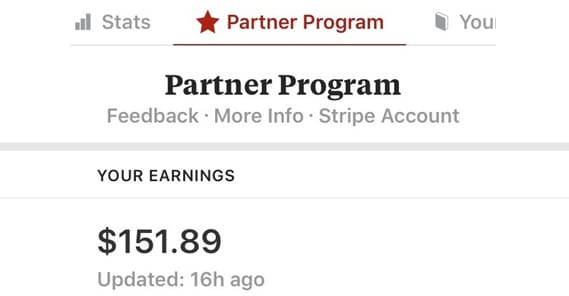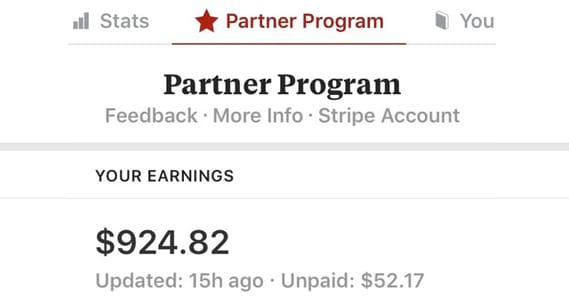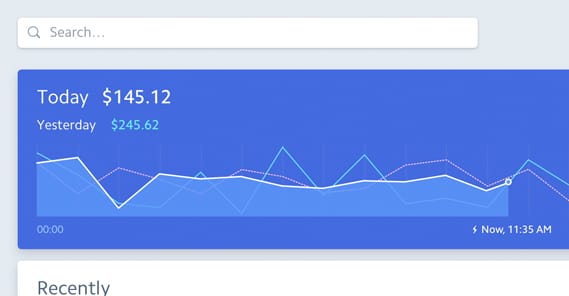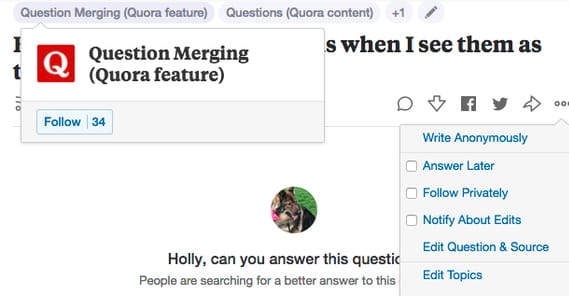Quora is a bit of a strange platform. For years they have struggled to monetize, operating largely on seed capital while they figure out how to build from a Yahoo Answers clone into a useful resource for a wide variety of topics.
Some of you might know that recently they launched a partner program. This program allows people who ask questions to earn money based on the quality of the answers and, presumably, the traffic the page acquires.
The question is, how much of a money-maker is it? Let’s dig in.
The Quora Partner Program FAQ
The partner program is quite interesting, in that it operates like a revenue share program the same way sites like Hubpages pay their writers. Some of you may remember when these programs were everywhere, 5-10 years ago. A huge portion of them folded and closed back in 2011, primarily due to Google’s Panda update. Since most of these sites relied on pageview monetization via hundreds of thousands of thin, keyword-optimized pages, Panda’s move to higher quality content crushed them.

It’s interesting to me, then, that Quora has decided to start up this kind of business model in 2018. Their site often relies on mediocre questions with a ton of answers from businesses shilling their own services. So let’s look at their FAQ and see what information we can gather from it.
There is no limit to the money you can make from the Quora partner program. That’s the first question in their FAQ, and it’s plainly stated. As long as you can ask questions that meet their minimum standards and get answers that meet their quality bar, you’ll get paid.
How do you get paid? Right now, Quora is linked with Stripe, and nothing else. You can’t get paid by check or Paypal, Stripe is the only option. You don’t have to link up an account right away, but once you have earned $5 from your questions, you’ll be given the option to do so. However, you aren’t issued a payment until you’ve racked up at least $10. Once your account reaches $10, you will be sent that money each month. Well, they will “send it to you within 60 days” at least.

What this says to me is that a lot of accounts are going to start up their partnerships, ask a few questions, earn $5-9, and never reach the payment threshold. Quora gains content and doesn’t have to pay for it. Oh, I’m sure plenty of other people will reach payout thresholds, it’s not like Quora will cut you off, but every kind of partner program of this sort ends up having loads of cash that is never cashed out. It’s just the nature of minimum payouts.
As of right now, the Quora Partner Program is invite-only. You can’t apply to join it, you just need to use the site and get invited. People who are invited can’t invite other people as of yet, I don’t know if they’ll add referrals or anything in the future.

What’s odd is that Quora doesn’t seem to have certain standards for inviting people. It seems to be largely random. I know two people who have Quora accounts but have never asked or answered a question, but were still invited to join the program.
I suppose this could be a two-fold push for Quora. They might be pushing to get more content by incentivizing it, while also pushing to get more active users the same way. If they can hook people who haven’t used the site by paying them a few bucks, it’d be worth it for their bottom line. At the very least, it would make them look better for investors.
As of now, the Quora partner program is only open to residents of the U.S. who are eligible to work in the country, and it’s only available in the English-language sections of the site. Once the pilot program expands, I imagine they will open it up to other languages and countries, but for now, it’s quite restricted.
Quora Partner Compensation
Here’s where things get a little hazy. How does Quora decide how much to pay, and what do they pay for?
First of all, Quora only pays for asked questions. You cannot earn money by answering questions, presumably because they know a ton of people are already just using the site to shill their own businesses. There’s no sense in paying people to use your platform for advertising, that’s just not how it works.

In fact, I wouldn’t be surprised if Quora introduced some kind of paid advertising to further shill answers as promoted answers. They already have advertising, but another layer of it wouldn’t be all that out of place. That’s just pure speculation on my part, though.
How much does Quora pay? They won’t say. What they do say is that “Questions are compensated based on how well-answered they are and how many people find them interesting.”
What this says to me is two things. First, it’s going to be a lower number than you might want, but because it’s just asking questions, you don’t need to spend a ton of time on it, so the returns might be worthwhile. Second, it’s going to lead to a lot of the same sort of black hat abuse that you see on social networks and other, similar sites. If upvotes matter, people will spring up selling upvotes. Indeed, it wouldn’t surprise me if there are Fiverr sellers mobilizing their botnets already.
Oh, and anonymous asks do not count. Since you ask a question anonymously, it’s not tied to your account, and thus Quora won’t be able to credit your account with the question. There’s no real problem with this, it’s just worth mentioning.
It’s also worth noting that you only earn on questions for 1 year (12 months). You can’t build up lifetime value on questions, because you only make money for the first month after you ask them. This is yet another way that Quora is exploiting their community: they incentivize askers to ask great questions and encourage as much value as possible as quickly as possible. This then makes those posts rank well in Google for those subjects, boosting Quora as a whole. They can then keep monetizing those questions after they stop paying you, and rake in more value overall.

Quora is also going to be very on the ball with moderating questions. Any time a program like this opens, you’re going to have a flood of people mobilizing to ask as many questions as they can, to get as much money as they can while the getting is good. Quora has two mechanics in place to minimize this: merging and moderation.
Moderation is simple. Quora employees will review questions and, if they’re too low quality, don’t fit the site, focus on illegal activity, or otherwise aren’t something Quora wants on their site, the moderators can remove it. Question askers can appeal the decision, but chances are most moderation decisions will be final.
is a process where Quora can detect questions that are very similar or identical, and merge them into one question, putting all of the answers in one place. This is likely to backfire on a few askers and will prevent people from duplicating popular questions in hopes of attracting a burst payout.

So here’s the real question you’re all probably dying to ask. How much does the Quora partner program pay? The answer is, right now, I have no idea. No one who is in the program seems keen to talk about the figures, and the program is so new that I doubt anyone has racked up enough money to get a payment.
The fact is, I really don’t expect much from the program. Think AdSense PPM levels here. You’re essentially just getting revenue share from popular questions, possibly with a multiplier if you get one that goes hugely viral. It’s almost definitely not going to be worth much more than beer money unless you’re dedicating an insane amount of time to it.
This does lead me to my next statement, though. If you’re part of the Quora Partner Program and are willing to disclose how much you’ve made from it, feel free to post in the comments or send me a message. On the off chance that it’s actually worthwhile, it’d be good to know.
Alternative Money-Making
Now, the partner program only works if you’re the one asking questions, and it’s going to make you a minimal amount of money. Quora might say there’s no limit, but the fact is, they can’t be making much money off of it, so they won’t e paying much.
How can you make more money from Quora? Well, if you own a business, you can do what so many thousands of other business owners are doing. Answer questions!

Answering questions on Quora is a valid marketing strategy. So is asking them, but answers are more likely to get you the referral traffic you want.
The general strategy is . Follow the channels that are most relevant to your brand and business. Look for questions that relate to some feature your product can perform. When you find a relevant question, draft up an answer.
You should be looking for questions that are relatively new. Answering older questions has a role for marketing, but it isn’t likely to get you much promotion or much exposure on Google. Your ideal goal here is to answer questions that will rank on Google and get your answer shown as much as possible to as many people as possible.
Write up a good, solid answer to the question. If the user is asking for a product recommendation, just write up a paragraph or two about your product. If they’re asking about how they can accomplish a specific task, recommend your product and then write a tutorial on how they can accomplish their goal.
That second part is crucial! You want your answer to be as useful as possible.

See, there will be competition, but a lot of the competition is going to be writing formulaic recommendation answers, not step by step tutorials. The better your tutorial, the more likely you are to be voted top answer. Top answers are often reference in other blogs around the internet, and get the most exposure from both Google and Quora.
If you want to dive a little into the black hat aspect of this kind of marketing, there are two other techniques you can add on to this. The first is anonymity; make a fake profile for someone who isn’t associated with your company, and post the same content without disclosing your tie. This is, of course, illegal, so keep that in mind.
The other technique is to purchase upvotes from some seller on Fiverr or what have you. The most upvoted answers tend to float to the top, while others are truncated or hidden. If you get yours to dominate the answers, you have a better chance of referring new customers.
Of course, none of this is actually making money from Quora. Instead, it’s just inbound marketing strategies to get more traffic to your landing pages, which you can ideally convert into customers later. All of that is, of course, up to you to handle.
With this strategy, the amount of money you can make is unlimited. It depends entirely on how well you can convert traffic into customers. It might not even be the most effective of your marketing channels, but hey, at least answering questions on Quora is free.
Source: https://growtraffic.com/blog/2023/06/how-money-earn-quora





0 Comments